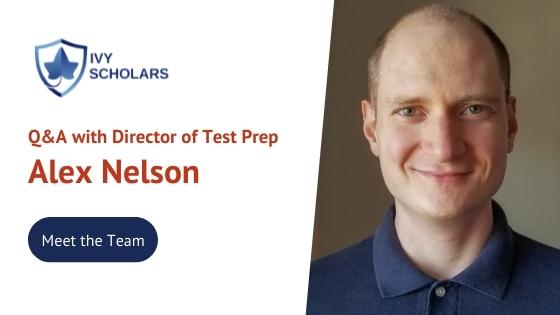Describe your journey into college admission coaching and test preparation? When and how did it happen?
I always thought I wanted to be a teacher and enjoyed tutoring, which I did for four years in high school. My tutoring journey started in ninth grade when I joined the math club and tutored 9th and 10th graders. I also got a perfect score on my SAT when I was a junior and became a National Merit Scholar, so I knew the tests well and wanted to help other students.
I started working for the Princeton Review in 2007 when I was a sophomore at Rice University. I started part-time and was essentially a full-time employee when I finished college. I rose through the ranks at the company and became their “Premiere Tutor” and teacher trainer for the East Texas region.
I stayed at the Princeton Review until 2017 when I left to work with Ivy Scholars.
Describe your process for helping students improve their SAT and ACT scores. Where should they start?
Everyone should start by taking a practice test. You have to know where you stand, review your mistakes, and make a log of your errors.
I use a spreadsheet system for my students. For every question you miss, you need to analyze what made you miss that question. You should try to pinpoint what was wrong with your answer, prove the correct answer, and formulate a generalized tip to follow the next time you see the question.
Many students will look at a question they got wrong and conclude that they chose a good answer but that the test scorers liked the other answer better. This is a misconception. There is one correct answer and three (or four) incorrect answers.
It can be a tedious process, but you have to break down your mistakes and learn from each one. Then, after you’ve done a few tests, you go through all the questions and retry them to see if you learned from your mistakes. By doing this, you’re creating a process that will help you continue to learn and improve.
Working with someone at Ivy scholars gives you a more profound sense of understanding these tests because we will provide you with better, more specific advice. We know what strategies work for each type of problem, and we know how likely each type is to show up on your real test.
An excellent score takes more than correctly answering the questions; it takes answering them within the time limit. When a student is struggling with the test-taking pace, we watch them work a timed section question by question to see how they’re approaching each question and identify ways to solve problems more quickly. This is typically very difficult for students to do on their own.
For students aiming for Ivy League or elite colleges, is there a certain age or grade level that you typically recommend for somebody to start to get into practice tests? When should they first get a benchmark?
There are two goals we consider with standardized testing in high school. The first is the PSAT and its role in qualifying students to become National Merit Scholars, which is impressive to have on your application. It is, in some ways, better than having a perfect SAT score.
The second is the student’s SAT/ACT score regarding their college applications. Students take a PSAT in 9th or 10th grade through their school, which is typically the first benchmark. In this timeline, students have a whole year until their junior PSAT, the one that counts, and from then, you have up to two years to improve your scores.
If students aim for admission to an elite college, they typically need a score in the top 1% or better. If you score 1000 on your 10th grade PSAT, you have an average or slightly below average score. If you’re serious about getting that top 1% score, and you’re sitting at an average score, that’s a sign that you need to start prep right away.
Most students who achieve an average score on their 10th grade PSAT will not shoot for that huge score improvement in one year. It isn’t easy to achieve, but if you’re trying to get there, you want to reach it by the first semester of your junior year. Someone who gets a top 20% score on their sophomore PSAT is a more typical case for getting into elite colleges. If you want to have a good run at that 11th-grade PSAT, you have to prep hard over the summer and fall to get your score up.
Some students want to wait until they’ve taken more math classes. In this case, it’s usually still best to start prep in the summer before 11th grade to have a full year to improve before college application deadlines.
What makes Ivy Scholars unique? How do you approach test prep specifically?
Our admissions consulting and candidacy-building programs make us unique as a company. Concerning test prep, the number one thing that makes us unique is how we use the mistakes journal to prepare more efficient lessons than classes and other 1-on-1 tutoring methods.
Most tutors and most tutoring companies will approach homework by giving students a test section to work on. Then, students grade the section on their own and sit down with a tutor to go over the questions they missed one at a time to learn how to solve each one. On the surface, it seems like they’re covering all the missed questions. However, this is not the most efficient use of the student’s time.
The most efficient use of time is for students to figure out their own mistakes as much as possible. This is beneficial for two reasons. Number one, when you write stuff down and figure things out on your own, you will generally remember it better than if somebody teaches it to you. Of course, we’re proud of being good teachers, but figuring out something on your own is always going to be the best.
For efficiency, students must have their journals filled out for their homework by the night before we meet in our program. That way, the tutor has time to prepare the lesson effectively. We look through the questions that the student missed and their analysis. Then, we can tell if they fully understand the mistake. This makes the session more effective and allows us to spend more time on challenging problems.
Additionally, I feel our tutors are better qualified in that they can teach the content. Our tutors also have an average of over five years of test-prep experience, more than larger companies with college-aged tutors and high turnover.
What are the most significant challenges or current trends in test prep that you think parents and students should be aware of?
Test anxiety has become an extremely prevalent issue that I have noticed occurring more frequently in students. This issue can be identified when a student has a dropoff in scores from their practice tests to the real thing.
College admissions have become more selective, and as a result, students know that they have to perform at an elite level. You can only make a couple of mistakes if you want a top score. This added pressure can create distractions, making it challenging for students to apply what they’ve learned in practice. Another issue students face is going too fast or too slow on the actual test. The key is to stick to the strategy that produces positive results in practice.
My advice is to take the test multiple times in an authentic setting to get more comfortable with the high-pressure scenario. Don’t “try harder” on the real test – just stick to the plan that worked in practice.
How many times should students take the SAT?
Let’s address this in the context of two scenarios.
The first scenario is the student who isn’t particularly struggling with performance anxiety, which means their practice tests are about the same as their real test. I would stop after about three, maybe four tests for that type of student. However, this amount is based on whether you have appropriately prepared for the test. I’ve had plenty of students who took the actual test three or four times before coming to us, and we helped them break through the plateau.
Next, we have the student with performance anxiety. Let’s say you’re getting 1520-1530 in practice tests, and then you take the real thing for the first time, and you get 1380. You usually don’t have to prep that much more. You should take a practice test every two weeks, make sure you’re still performing at that same level, and then retake the actual test. The three to four limit does not apply as much when you have a dropoff between your practice tests and the real thing. In this case, you know you’ve been able to get this many questions right in practice, and you know that that’s possible for the actual test, so you need to keep at it until it clicks.
To summarize, in my experience, with good prep, and without performance anxiety, about three or four tests are ideal. It is five or even six tests on the high side for some.
What’s your favorite part of your position? Describe your perfect day at Ivy Scholars.
My perfect day at Ivy Scholars is meeting students and knowing that they learned something after each session. I also find it incredibly rewarding when students show improvement on practice tests and the actual test.
The thing that keeps me going and loving the job after doing it for 14 years is that every student is different, and I have to bring all my experience and knowledge to figure out the right way to teach them.
I still say to half of my students, “I haven’t seen someone approach this problem quite the way that you did.” I loved the SAT when I was preparing for it and taking it. I thought it was like a great puzzle. The next level of solving a puzzle is developing the ability to help someone else solve the puzzle, and I love the challenge.
Any closing thoughts or advice for students and parents preparing for the SAT/ACT?
I often advise students not to worry about it too much because it’s not truly the end all be all. If you don’t get the best score or even if you don’t end up going to the best school, it’ll work out. Test scores are not an accurate prediction of their success in college or in the real world.
Grades in high school are much better predictors of success statistically. I’ll use myself as a personal example. I got a perfect SAT score, but when I got to college, I lacked a strong support system and had a rough first semester. I failed two classes before I got back on track.
An additional last-minute piece of advice is that you should not be working on or learning new things in the few days before the SAT. Instead, focus on the problems you worked on before to understand your mistakes fully.








